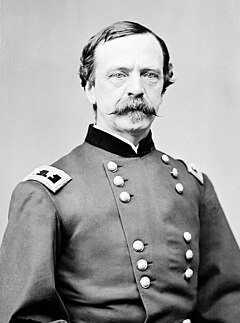Daniel Sickles
| Daniel Edgar Sickles | |
|---|---|

Major General Sickles circa 1862
|
|
| Member of the U.S. House of Representatives from New York's 10th district |
|
|
In office March 4, 1893 – March 3, 1895 |
|
| Preceded by | William Bourke Cockran |
| Succeeded by | Amos J. Cummings |
| Member of the U.S. House of Representatives from New York's 3rd district |
|
|
In office March 4, 1857 – March 3, 1861 |
|
| Preceded by | Guy R. Pelton |
| Succeeded by | Benjamin Wood |
| United States Minister to Spain | |
|
In office May 15, 1869 – January 31, 1874 |
|
| Preceded by | John P. Hale |
| Succeeded by | Caleb Cushing |
| Member of the New York Senate from the district |
|
|
In office January 1, 1856 – March 3, 1857 |
|
| Preceded by | Thomas J. Barr |
| Succeeded by | Francis B. Spinola |
| Personal details | |
| Born |
October 20, 1819 New York City, New York |
| Died | May 3, 1914 (aged 94) New York City, New York |
| Resting place | Arlington National Cemetery |
| Political party | Democratic |
| Spouse(s) |
Teresa Bagioli Sickles (m. 1852–67) Carmina Creagh (m. 1871–1914)\ |
| Awards | Medal of Honor |
| Military service | |
| Nickname(s) | "Devil Dan" |
| Allegiance |
United States of America Union |
| Service/branch |
United States Army Union Army |
| Years of service | 1861–1869 |
| Rank |
|
| Commands |
Excelsior Brigade III Corps |
| Battles/wars | |
Daniel Edgar Sickles (October 20, 1819 – May 3, 1914) was an American politician, soldier, and diplomat.
Born to a wealthy family in New York City, Sickles was involved in a number of public scandals, most notably the killing of his wife's lover, Philip Barton Key II, son of Francis Scott Key. He was acquitted after using temporary insanity as a legal defense for the first time in United States history. This became a defense associated with 'crimes of passion' (crime passionnel in French).
Upon the outbreak of the American Civil War in 1861, Sickles became one of the war's most prominent political generals, recruiting the New York regiments that became known as the Excelsior Brigade in the Army of the Potomac. Despite his lack of military experience, he served as a brigade, division, and corps commander in some of the early Eastern campaigns. His military career ended at the Battle of Gettysburg in July 1863, after he moved his III Corps (without orders) to an untenable position where it was virtually destroyed. He was wounded by cannon fire and had to have his leg amputated. He was eventually awarded the Medal of Honor for his actions.
Sickles devoted considerable effort to trying to gain credit for helping achieve the Union victory at Gettysburg, writing articles and testifying before Congress in a manner that denigrated the intentions and actions of his superior officer, the army commander, Maj. Gen. George G. Meade. After the war, Sickles was appointed as a commander for military districts in the South during Reconstruction. He also served as U.S. Minister to Spain. Later he was re-elected to Congress, where he helped pass legislation to preserve the Gettysburg Battlefield.
...
Wikipedia
